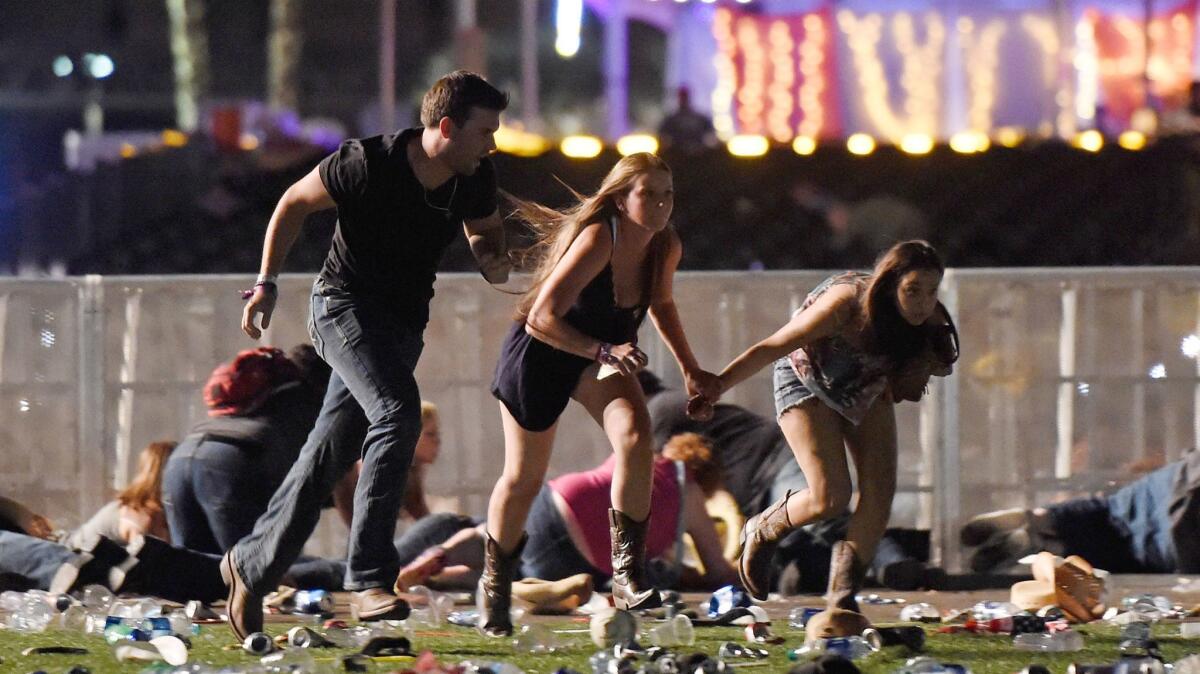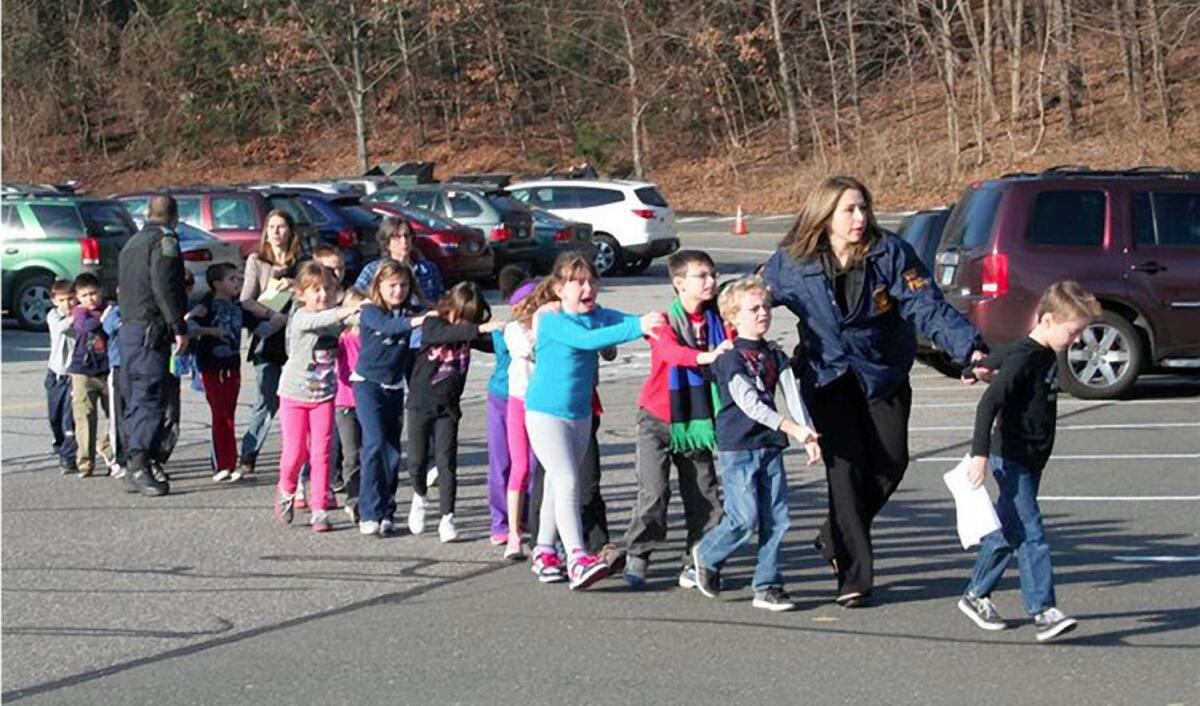California adopted some of the toughest gun control laws in country after multiple mass shootings

In the wake of the worst mass shooting in modern U.S. history, some say the nation could look to California, a state where previous incidents have sparked laws to combat gun violence, for guidance.
“I urge statehouses across the nation to look closely at the work we’ve accomplished here, through the Legislature and the ballot box, and act,” Lt. Gov.
California has some of the toughest gun control laws in the nation, in part because of its history of gun violence. Here is a look at the last 30 years.
Jan. 17, 1989
Five dead: Stockton
California approved the nation’s first law banning the sale of military-style assault weapons in California after the killings of five Southeast Asian refugee children in a Stockton schoolyard.
The children were killed by a mentally ill drifter clad in combat fatigues, who fired 105 shots from a Chinese-made AK-47 at the playground. He also wounded 29 other children and a teacher before turning the gun on himself. The Roberti-Roos bill was announced before the shooting, but supporters said the massacre provided the outrage and emotion needed to get the bill passed. Republican Gov. George Deukmejian, who generally opposed gun control, signed it on May 24.
At the time, Deukmejian was anguished over the killing of children and said he hoped the bill would “save innocent lives.”
Years later, in 2013, Deukmejian told The Times: "My thoughts simply were that regardless of what argument somebody might make about having the right to own and possess a gun, there was no common-sense reason for someone to have an assault weapon.”
July 1, 1993
Eight dead: San Francisco
A gunman at a San Francisco law firm killed eight and wounded six before killing himself. The attack at the Pettit & Martin law firm was cited by California Sen.
Feinstein’s career has been marked by violence. In 1978, former county Supervisor Dan White shot and killed San Francisco Mayor George Moscone and Supervisor Harvey Milk. Feinstein took over as mayor.
At the state level, California lawmakers in the succeeding years approved additional restrictions, including a ban on purchasing more than one handgun a month and a requirement that handguns meet basic safety standards.

Dec. 14, 2012
20 dead: Newtown, Conn.
Stricter gun controls were enacted in California after the 2012 shooting deaths of 20 students and six adults at Sandy Hook Elementary School in Connecticut and the murder of 12 people by a gunman in a Colorado movie theater that same year.
Resulting laws include a prohibition on kits that allow ammunition magazines to be altered to hold more than ten rounds and a five-year ban on firearm possession by anyone who makes serious threats of violence to psychotherapists.
May 23, 2014
Six dead: Isla Vista
A disturbed young man killed six UC Santa Barbara students and wounded 13 other people in a shooting and stabbing rampage in Isla Vista.
After reports that the shooter’s family had unsuccessfully sought help from authorities over concerns he might become violent, legislation was introduced and signed into law that allows the seizure of guns from people determined by the courts to be a threat to themselves or others. The measure allows family members or law enforcement officers to petition the court for a restraining order.
Oct. 1, 2015
Nine dead: Roseburg, Ore.
Newsom, who is running for governor, authored a gun control ballot initiative partly in response to a mass shooting that left nine dead at Umpqua Community College in Roseburg, Ore.
The initiative, Proposition 63, requires a background check and Department of Justice authorization to purchase ammunition, prohibits possession of large-capacity ammunition magazines and establishes procedures for enforcing laws prohibiting firearm possession by certain people, including felons.
Dec. 2, 2015
14 dead: San Bernardino
At the same time the initiative was moving forward, California lawmakers introduced six gun control bills in response to the terrorist attack in San Bernardino that left 14 people dead.
The measures included a ban on large-capacity ammunition magazines, a requirement for background checks on those buying bullets, and new restrictions on semiautomatic rifles.
Gov. Jerry Brown signed them into law on July 1, 2016, saying at the time in a statement: "My goal in signing these bills is to enhance public safety by tightening our existing laws in a responsible and focused manner, while protecting the rights of law-abiding gun owners.”
California voters in November 2016 approved Proposition 63, which earned 63% of the vote.
Senate leader Kevin de León (D-Los Angeles), who authored some of last year’s bills, said Monday that he hoped the Las Vegas massacre would convince national leaders to follow California’s lead.
“California has learned its lesson and taken steps to ban military-grade weapons and large-capacity magazines,” De León said. “I hope that Congress will consider the casualties of its cozy relationship with the gun lobby and finally find the courage and independence to stand up to them.”
Craig J. DeLuz, a spokesman for the Firearms Policy Coalition, a gun owners’ rights group, denounced political commentary about gun control.
"Gavin Newsom and Kevin de León are nothing more than opportunistic politicians who prey on tragedies for headlines, so it’s not surprising that they would try to rush to promote gun control before the police have finished their investigation,” DeLuz said. “They treat anti-gun laws as magic talismans that will ward off evil. It hasn't worked in California and it won't work in other states.”
ALSO
California voters approve gun control measure Proposition 63
California voters support gun control initiative, Proposition 63, poll says
Tempers flare as lawmakers move forward with a dozen gun-control bills in wake of Orlando shooting
Get the L.A. Times Politics newsletter
Deeply reported insights into legislation, politics and policy from Sacramento, Washington and beyond. In your inbox three times per week.
You may occasionally receive promotional content from the Los Angeles Times.



